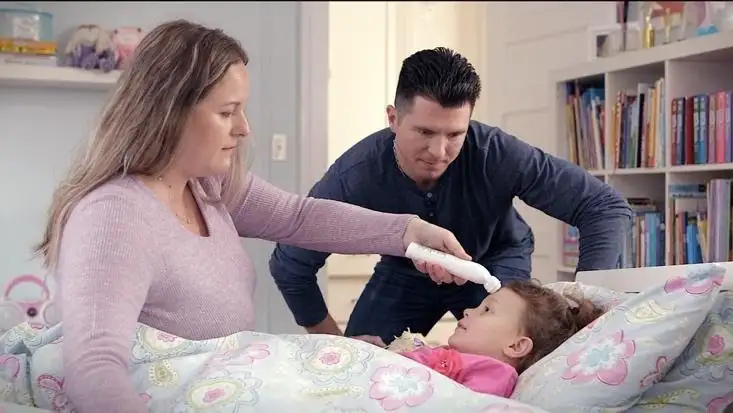Written by: Dr. Harley Eisman, CMO
Updated by: Lindsay Peltsch on September 11, 2023
For Pediatricians, Nurse Practitioners, and Pediatric Nurses, questions about fevers and how to treat them are some of the most common that we get. As not only providers, but parents ourselves, we get it. Having a child that is feeling unwell with a fever or pain is a worrisome thing.
Fever — boon or bane?
Kids with a healthy immune system generate fever to help get rid of infection. The act of the immune system fighting the infection creates heat as a byproduct – it’s hard work! Also the brain signals to increase your temperature so that the body is less hospitable to the germs. Pretty amazing actually. What is important to remember is, fever is never dangerous — it’s an important immune system tool.
Therefore, to allow your child’s body to do its best germ fighting work. We should not give Tylenol (acetaminophen) or Advil (ibuprofen, Motrin) with the primary goal of “driving down the fever”. Instead it should be to give tylenol and advil if your child is feeling unwell. Otherwise, let that body do its work!
How do I help my child feel better?
Kids with fever often don’t feel well. They can be quite irritable, with body aches or headaches, along with a poor appetite.
We are absolutely not saying that you should avoid treating their fever if your child is unwell. Their immune response will still work perfectly fine without the sauna effect.
Giving them Tylenol or Advil to make them feel better is a good thing to do, because if they feel better, they’ll be less miserable and more likely to drink and stay hydrated. Dehydration is a real risk in children who are sick, and optimizing their pain and fever so they can remain hydrated is important.
Plus, if you give them Tylenol or Advil and there’s no improvement in how they feel, it may be time to consult with your KixNurse or your healthcare provider.
So which to give?Advil or Tylenol?
The unsatisfying but truthful answer is that BOTH Advil and Tylenol are very effective for relieving pain and discomfort. Although Advil is better with inflammation(swelling). While both will work on any pain. Tylenol is especially great for aches and pains, headaches, and post surgical pain. Meanwhile, Advil is fabulous for sprains and strains, but also things like erupting molars, that cause swollen painful gums.
KixTips:
Children under 6 months should not take Advil unless advised by a healthcare professional. Start with Tylenol.

When your child is in pain or unwell, we suggest you pick one of the meds described (tylenol or advil) and give it. Wait for an hour or so and see how your CHILD improves.
Does their temperature go down? It actually doesn’t really matter, what we want to see is that they get relief from the symptoms that were bothering them, and they LOOK better.
TREAT THE CHILD NOT THE NUMBER.
Can I give Tylenol AND Advil together?
IF after giving one medication you do not see enough of an improvement in their temperature and symptoms, chat with your KixNurse about possibly giving a dose of the other medication you haven’t given yet. Giving Advil and Tylenol together is a powerful extra tool in your tool box. While each works well on their own. They are EXTRA effective together.
HOWEVER, many healthcare providers do not recommend this as people can become confused about the timing and accidently give too much of one or the other. Tylenol and Advil are separate medications and each need their own schedule.
Tylenol every 4 hours, Advil every 6 hours.
If you are giving tylenol, the only thing that matters is when you gave the last tylenol dose. Was it 4 hours or more ago? Great, you are good to go. When you last gave Advil does not matter to the schedule for tylenol.
Likewise if you are giving Advil, the only thing that matters is when you gave the last Advil dose…was it 6 hours ago? If it wasn’t, you need to wait. If it was, then you are fine to give it.
Example:
Dominic is 6 years old and has influenza (the flu).He has a fever and is feeling achy, headachy, with chills and sweats. He doesn’t feel like drinking very much. His mom gives him a dose of Tylenol. While it brings his temperature down slightly, he doesn’t get full relief of his symptoms. His Mom reaches out to their KixNurse, who assesses him and lets them know that a dose of Advil may help. She helps mom make a plan of when to give each of the medications so that there is no confusion.This is his medication plan:
Tylenol: Last given at 6pm. So he can have another dose at 10pm, 2am, and 6am. If he goes longer between doses that’s ok. Just make sure it’s a minimum of four hours.
Advil: He hasn’t had a dose yet, so give a dose now at 8pm. His following doses can be at 2am, and 8am.
The KixNurse plans to check in with mom in the morning to see how his night goes and whether he should continue to take both or see if one will suffice as he gets over the virus. Mom can also reach out if she is confused or has concerns overnight.

KixPlug: Doesn’t this support sound great to have? We think so! All of our subscribers get 24/7 access to care just like this for any questions, support or follow up. If you aren’t a member yet, what are you waiting for!? Sign up today.
Advil is processed in your kidneys, while Tylenol is processed in the Liver. Two totally different systems. Like anything, the dose makes the poison and too much Tylenol can cause damage to the liver. Advil, whether too much or for too long can irritate the stomach lining or hurt your kidneys.
We recommend printing off our KixCare medication tracker to help you keep track, and to chat with your KixNurse to help make sure your child is getting their medications safely.
Will giving Advil or Tylenol around the clock cause damage? You said don’t give too much.
While it’s absolutely true that too much of either medication can cause damage. It’s important to think of their consumption over a longer period. While round the clock of either or both Advil or Tylenol for weeks or months is not ideal. Most children will take these for the duration of their illness and then will likely need less and less until they have a period of NO medication. Giving their body a break. So, feel free to give your child the medication they need to be comfortable, and check with your KixNurse or health care provider if you are concerned.
Fevers in children can be stressful, but when you have a plan of how to deal with them can make it a better experience for both of you. Next time you are wondering what to give, remember that EITHER are fine. Start with one and watch for effect.
Also remember to treat the CHILD, not the fever. Always follow dosing instructions. If you feel concerned, reach out to your KixNurse or your healthcare provider.
Want more great content like this?




